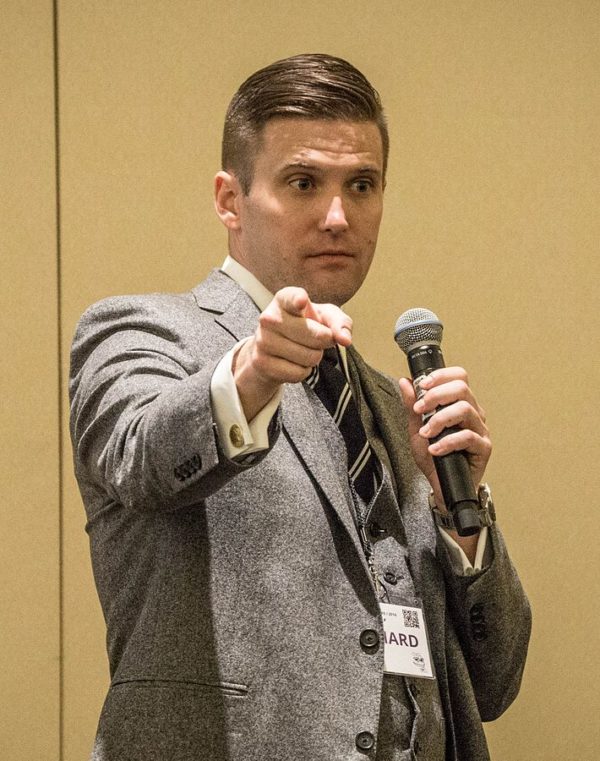
In answering one set of issues related to his tax status, the small Montana-based nonprofit run by white nationalist Richard Spencer has raised a number of others that may have more far-reaching effects on community foundations and donor-advised funds.
Spencer said last year that his National Policy Institute had been told they weren’t required to file IRS Form 990 returns. Earlier this year, the IRS announced that it had revoked the Institute’s tax-exempt recognition for failing to file returns for three consecutive years. On Monday, the Institute provided the Los Angeles Times with copies of its 2013, 2014, and 2015 Form 990 returns, including the nonprofit’s significant donor list as reported on the Form 990’s Schedule B for 2013 and 2014.
National Policy Institute’s reported annual revenue since 2011 has varied between $85,000 and $145,000, so reports that the Institute used more than $26,000 between 2011 and 2015 to pay off credit card charges and bank fees appears to be significant. Not so, says Spencer.
“This is not important,” Spencer said, declining to comment when […] asked […] how he accumulated the charges.
“I think people can be relieved to know that [the National Policy Institute] isn’t some personal slush fund, that I spend money on projects…. The amount of work that I have put into the movement speaks for itself.”
Spencer draws very modest compensation from the nonprofit and won’t say how he supports himself. However, according to the Center for Investigative Reporting, his family “owns millions of dollars worth of cotton farmland in Louisiana” and has received “at least $2 million in subsidies from the federal government over the last decade.”
The disclosure of the Form 990’s Schedule B donor information is exceptional because 501(c)(3) public charities like the National Policy Institute are not required to make the Schedule B public, and the IRS does not include it in the information shared with GuideStar and other organizations that store nonprofit Form 990 information for public access.
Sign up for our free newsletters
Subscribe to NPQ's newsletters to have our top stories delivered directly to your inbox.
By signing up, you agree to our privacy policy and terms of use, and to receive messages from NPQ and our partners.
This revelation by Spencer has brought to light 2013 and 2014 donations to the Institute totaling $25,000 from the Community Foundation for the Central Savannah River Area (CFCSRA) (GuideStar profile). Community Foundation officials said the gifts of $15,000 and $10,000 were made from a donor-advised fund within the foundation at the donor’s request.
Typically, a community foundation or other third-party charitable intermediary will honor a donor’s gift request if the recipient is an organization recognized as a 501(c)(3) tax-exempt public charity by the IRS—which the National Policy Institute was at the time. This is what happened at CFCSRA.
It is not common for third-party intermediaries to evaluate whether a gift from a donor-advised fund or similar vehicle to a recognized charity will reflect badly on the intermediary, but this appears to be changing. Readers may recall a few recent instances of donor-advised funds and similar vehicles running into values conflicts with the larger intermediary. In one case, the Jewish Community Foundation of L.A. declined to make a grant requested by a donor because the foundation was politically uncomfortable with the grantee, IfNotNow, a group largely comprising younger Jews with controversial positions on the Israeli-Palestinian conflict. In another, a donation of $120,000 from John and Laura Arnold to a special fund at the Baltimore Community Foundation was used to fund a massive surveillance program. The foundation’s CEO admitted he was unaware of the grant, and because they did not have to approve the measure in a budget hearing, the public’s voice went unheard.
In this particular case, a media statement from community foundation CEO Shell Berry said, “The policies of the CFCSRA were modified in 2015 with the intention of preventing any grantmaking that is inconsistent with our values as an organization.” We expect that many other third-party intermediaries will join the Community Foundation for the Central Savannah River Area in updating their donor advised gift-giving policies.
Incidentally, a review of the CFCSRA’s Form 990 revealed that until 2015 the foundation had not itemized gifts on the form’s Schedule I as required. According to its 2015 Form 990, CFCSRA held assets of about $65 million and distributed roughly $8.6 million in grants. Berry told NPQ that the community foundation’s accountants recommended a change for the 2015 Form 990 and that 2015 and subsequent 990 returns will have grant awards in excess of $5,000 itemized. NPQ asked Berry to identify the donor or donor-advised fund that gave to the National Policy Institute in 2013 and 2014, but she refused. She also said the community foundation has never produced an annual report but that it hopes to in the future. With no disclosure from the community foundation officials, either verbally or in the form of annual reports, and the single-line reporting of 2013 and 2014 grants on the foundation’s 990, we’ll probably never know who used the community foundation to support the National Policy Institute.
We don’t know whether the National Policy Institute has produced the three years of Form 990 returns with the intent of applying for reinstatement of its tax exemption. If so, Richard Spencer may need to stop saying, “I don’t understand this stuff,” presumably meaning nonprofit governance compliance, and may need to ask donors to give directly instead. Still, other questions regarding community foundations’ facilitation of grants that do not conform to their overall stated values remain.—Michael Wyland












